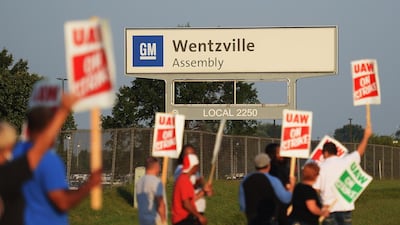The United Auto Workers union is leading its first strike against General Motors in 12 years, digging in for a fight over jobs and benefits that could cost the car maker dearly for an indefinite period.
The strike that took effect at midnight may cost GM about $50 million (Dh183.6m) a day in earnings before interest and taxes due to lost production, Credit Suisse analyst Dan Levy said on Sunday.
The shares fell as much as 3.4 per cent to $37.52 shortly after the open of regular trading Monday.
GM offered to invest in plants across the US and boost wages and benefits, but union leadership has been rocked by a corruption scandal and needs to show willingness to bring the fight to a car maker that has been scaling back its workforce.
“The union is playing some hardball. It seems they are pretty far apart,” said Kristin Dziczek, vice president of the labour and economics group at the Centre for Automotive Research.
GM’s offer “still doesn’t address some of the union’s demands”, Ms Dziczek said.
GM has offered $7 billion of investment in eight US plants and more than 5,400 extra jobs, most of which would be new hirings.
But the union said GM’s proposal fell short in key areas including health care, use of temporary workers and the time it took for shorter-tenured members to get to top-scale pay.
For GM, a short strike wouldn’t be catastrophic because the car maker has built up plenty of inventory, particularly with its more lucrative lorries and SUVs.
The company began the month with more than 820,000 vehicles in inventory, about 80 days’ supply, the Automotive News Data Centre said.
The union is seeking pay raises for entry-level workers, who start at less than $20 an hour, and to get them to the peak wage of almost $30 an hour in three or four years, instead of the current eight.
“Our members have been very clear about what they will and will not accept from this contract,” UAW vice president Terry Dittes said on Sunday.
“We are standing up for fair wages, we are standing up for affordable, quality health care
"We are standing up for our share of the profits. We are standing up for job security for our members.”
The union was disappointed that GM waited until two hours before its contract with the UAW expired to make its first serious offer, Mr Dittes wrote in a letter Sunday to the company’s vice president of labour relations for North America.
“Had we received this proposal earlier in the process, it may have been possible to reach a tentative agreement and avoid a strike,” he said.
Temporary employees and those working their way up the pay scale are doing the same work for less compensation, said Ted Krumm, the head of the union’s bargaining committee.
“We are fighting for the future of the middle class,” Mr Krumm said.
GM said it made the union a generous offer to invest in factories in four states, including a new vehicle in the Detroit-Hamtramck sedan plant that had been scheduled to close in January.
In Lordstown, Ohio, where GM has temporarily closed the factory that once had three shifts of workers making Chevrolet Cruze compact cars, it plans to set up the first union-represented electric-car battery plant in the US.
There are also four electric lorries coming that other UAW plants will build.
GM offered workers a signing bonus of $8,000 for each member if they ratify the deal, and wage gains or lump-sum payments in all four years of the contract.
The car maker says it is offering to keep members’ healthcare contributions the same as in the current contract.
“What GM is doing is highly unusual,” said Harley Shaiken, labour professor at the University of California at Berkeley.
“It’s going over the head of the UAW leadership and seeking to address the members and the public more generally.
"That is a highly risky strategy. It tends to galvanise the membership in support of the leadership and complicates an already tough situation.”
Before the two sides held talks over the weekend, the union was distracted by federal corruption charges in a scandal implicating the union’s president, Gary Jones.
The union's executive board met on Friday and discussed whether to remove Mr Jones from the role but he has kept his job, a spokesman said.
He was quoted in the union’s statement that called the strike.
“We told UAW GM members that we would stand up for them and their future,” Mr Jones said.
The walkout will be just the second national work stoppage at GM since a 67-day strike in 1970.
GM had a 54-day strike at a key plant in Flint, Michigan, in 1998 that effectively shut down most of its assembly plants.
The effect of the latest strike on the US economy will be negligible compared with 49 years ago, when the 400,000 workers GM employed represented about 1.2 per cent of the national payroll.
The car maker now has about a tenth the number of union-represented US employees.
Any deal the UAW reaches with GM would set a precedent for the jobs, wages, benefits that the union demands from Ford Motor Co and Fiat Chrysler Automobiles.
The union has not said which car maker it will target next for bargaining over a new contract.
GM has been under attack by US President Donald Trump for shrinking its US workforce and idling plants in the key electoral battleground states of Michigan and Ohio.
On Sunday, he sent a tweet calling for the company and union to “make a deal”.

